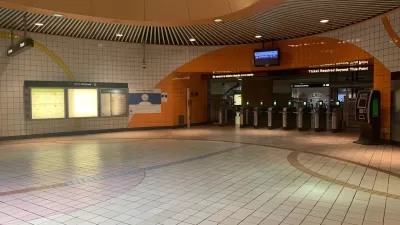Laura Bliss argues that rather than promise to reduce congestion, Los Angeles Metro should embrace its real beneficiaries: non-drivers.
Los Angeles County Metro's ambitious plans for the next 40-50 years rely on $120 billion from a proposed sales tax. Laura Bliss writes in CityLab that to win voter approval, the MTA needs to reassess how it presents the core purpose of building transit.
Transit advocacy, including Metro's own, often relies on the idea that access to transportation options reduces driving, which reduces congestion, which reduces carbon emissions.
But plenty of factors affect transit ridership rates that agencies cannot control—land-use planning and density, gas prices, free parking and other invisible driving subsidies, etc.—and research has disputed whether increased transit options really do replace driving. Bliss argues that they shouldn't have to:
"Transit doesn’t have to reduce traffic to be successful. Indeed, its central aim probably shouldn’t be serving the people who don’t actually use it. Transit’s best selling point is that it offers mobility to those who, for any number of reasons, can’t or choose not to drive. It also underpins bustling economic activity, pushes people into job centers, and improves long-term sustainability."
Embracing that angle could increase agencies' success, or even alter their project priorities—and go a long way toward clarifying the issues facing Los Angeles and other U.S. cities.
FULL STORY: To Ease Traffic, L.A. Needs Much More Than Trains

Planetizen Federal Action Tracker
A weekly monitor of how Trump’s orders and actions are impacting planners and planning in America.

Maui's Vacation Rental Debate Turns Ugly
Verbal attacks, misinformation campaigns and fistfights plague a high-stakes debate to convert thousands of vacation rentals into long-term housing.

San Francisco Suspends Traffic Calming Amidst Record Deaths
Citing “a challenging fiscal landscape,” the city will cease the program on the heels of 42 traffic deaths, including 24 pedestrians.

Defunct Pittsburgh Power Plant to Become Residential Tower
A decommissioned steam heat plant will be redeveloped into almost 100 affordable housing units.

Trump Prompts Restructuring of Transportation Research Board in “Unprecedented Overreach”
The TRB has eliminated more than half of its committees including those focused on climate, equity, and cities.

Amtrak Rolls Out New Orleans to Alabama “Mardi Gras” Train
The new service will operate morning and evening departures between Mobile and New Orleans.
Urban Design for Planners 1: Software Tools
This six-course series explores essential urban design concepts using open source software and equips planners with the tools they need to participate fully in the urban design process.
Planning for Universal Design
Learn the tools for implementing Universal Design in planning regulations.
Heyer Gruel & Associates PA
JM Goldson LLC
Custer County Colorado
City of Camden Redevelopment Agency
City of Astoria
Transportation Research & Education Center (TREC) at Portland State University
Jefferson Parish Government
Camden Redevelopment Agency
City of Claremont




























